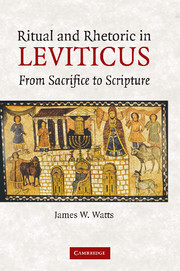Book contents
- Frontmatter
- Contents
- Abbreviations
- Preface
- Ritual and rhetoric in Leviticus
- 1 Introduction: Ritual Text and Ritual Interpretation
- 2 The Rhetoric of Ritual Instruction
- 3 The Rhetoric of Burnt Offerings
- 4 The Rhetoric of Sin, Guilt, and Ritual Offerings
- 5 The Rhetoric of Ritual Narrative
- 6 The Rhetoric of Atonement
- 7 The Rhetoric of Priesthood
- 8 The Rhetoric of Sacrifice
- 9 The Rhetoric of Scripture
- Bibliography
- Index of Biblical Citations
- Index of Other Ancient Literature
- Index of Authors
- Index of Subjects
8 - The Rhetoric of Sacrifice
Published online by Cambridge University Press: 22 July 2009
- Frontmatter
- Contents
- Abbreviations
- Preface
- Ritual and rhetoric in Leviticus
- 1 Introduction: Ritual Text and Ritual Interpretation
- 2 The Rhetoric of Ritual Instruction
- 3 The Rhetoric of Burnt Offerings
- 4 The Rhetoric of Sin, Guilt, and Ritual Offerings
- 5 The Rhetoric of Ritual Narrative
- 6 The Rhetoric of Atonement
- 7 The Rhetoric of Priesthood
- 8 The Rhetoric of Sacrifice
- 9 The Rhetoric of Scripture
- Bibliography
- Index of Biblical Citations
- Index of Other Ancient Literature
- Index of Authors
- Index of Subjects
Summary
The early chapters of Leviticus are commonly referred to as instructions for making sacrifices. In this book, I have discussed various aspects of these instructions as pertaining to “offerings,” but I have rarely used the term “sacrifice.” Though Leviticus appears to be more concerned with sacrifice than any other part of the Bible, that term turns out, on closer analysis, to have less to do with this book than most people think. A survey of the rhetoric of “sacrifice” in the contemporary world as well as in antiquity will explain my reticence in using the word, as well as point out the curious disjunction between Leviticus' instructions for offerings and later sacrificial rhetoric.
The language of sacrifice pervades our contemporary rhetoric of politics, religion, and popular culture. References to sacrifice and depictions of sacrifice can be found in music lyrics, movies, political speeches, and news stories about sports, economics, and biomedical research. It is, of course, ubiquitous in the rhetoric of war. Fascination with the idea of sacrifice is also reflected in the large number of academic theories about its nature and origins. For the past century and a half, scholars of religion, sociology, psychology, and anthropology have advanced theories to explain how sacrifice works religiously and why its practice and effects are so widespread. Yet every attempt to describe and explain “sacrifice” always fails to encompass the whole range of ritual and nonritual behaviors called sacrifices.
- Type
- Chapter
- Information
- Ritual and Rhetoric in LeviticusFrom Sacrifice to Scripture, pp. 173 - 192Publisher: Cambridge University PressPrint publication year: 2007

